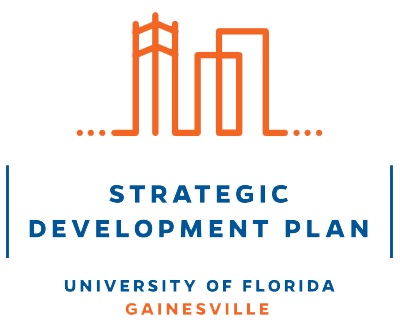
This map of Gainesville and its vicinity shows the roadways which will be part of four currently planned I-STREET projects.
The University of Florida, in partnership with the Florida Department of Transportation and the City of Gainesville, is preparing to launch the advanced transportation technologies testbed I-STREET (Implementing Solutions from Transportation Research and Evaluation of Emerging Technologies). I-STREET will encompass the University of Florida campus and the surrounding roadway network in the City of Gainesville. Initially, four main projects combine to form the base infrastructure of I-STREET, which will serve as a venue for many other projects.
The Gainesville Trapezium project will deploy and test connected vehicle technology and applications along four corridors forming a trapezium surrounding the UF main campus. The goal of the project is to improve travel time reliability, throughput, and traveler information. This project also plans to deploy pedestrian and bicyclist safety applications. The installation of approximately 45 roadside units will provide connectivity for all modes of transportation.
I-75 Florida’s Regional Advanced Mobility Elements (FRAME) will deploy automated traffic signal performance measures, intelligent transportation systems, and connected vehicle technologies to better manage, operate, and maintain the multimodal transportation system. This Integrated Corridor Management (ICM) solution on I-75 and state highway systems in and around Gainesville will reduce crashes on I-75 and reduce the impact of diverted traffic on the arterial roadways. Approximately 150 roadside units are planned for installation.
The city of Gainesville is planning implementation of an autonomous transit shuttle system to operate as a connector between downtown Gainesville and the UF campus. The City of Gainesville has just released an RFP (RFP NO. RTSX-180030-DS, GAINESVILLE AUTONOMOUS TRANSIT SHUTTLE – GAToRS), for a shuttle that will operate in a fixed route to keep vehicles arriving every 10 minutes during peak hours and every 20 minutes during off-peak hours. The project goals are to learn about public attitudes towards automation in transportation, to document the safety benefits of such a service, and to bring Highly Automated Vehicles (HAV) forward within a Connected Vehicle (CV) environment. This project is also intended to test UF-developed technology on these automated vehicles as well as provide data for new traffic and pedestrian applications.
The Accelerated Innovation Development (AID) project is a grant application submitted by FDOT to the US DOT for further consideration, to equip thirteen signalized intersections and seven midblock-crossings on campus with dedicated short-range communications (DSRC) technology. Passive pedestrian and bicycle detection will be installed at these locations to detect presence and provide walking speeds and counts.
In addition to the planned infrastructure enhancements, a number of research projects are ongoing. These include connected signal optimization, autonomous vehicle technology enhancements, transit instrumentation, sensor development, mobile applications, and data management.
Earlier this year the University of Florida’s Office of the Senior Vice President and Chief Operating Officer awarded more than $300,000 in research awards to seven UF-City of Gainesville research projects.
The call for proposals was announced in February by UF Senior Vice President and COO Charlie Lane, as part of UF’s Strategic Development Plan. Lane’s office received 62 proposals from about 40 departments and centers throughout UF in about one month.
Lily Elefteriadou, Ph.D., won one of the awards for research on the Public Acceptance of Autonomous Vehicle (AV) Technology. Nithin Agarwal, Ph.D., is her co-primary investigator for this research.
“A distinct goal of the Strategic Development Plan is to increase collaboration between the university and the city, and to connect UF’s talent and resources to Gainesville in a way that can make improvements in a number of areas,” Lane said.
The Strategic Development Plan seeks to shape the university and surrounding community’s future over the next 40 to 50 years and establish the framework for the “New American City.” The UF Transportation Institute’s testbed, I-STREET, is part of this plan.
The UFTI is preparing to release a Request for Information (RFI) to invite industry partners, private sector developers, research entities, and transportation innovators to express interest in implementing deployment-oriented approaches for real-world demonstration and testing. We are especially interested in emerging transportation solutions related to safety, mobility, and data management. The full RFI will be posted on the I-STREET website (link). Industry partners may opt to use the already equipped corridors to test their solutions or may consider using other corridors within the city of Gainesville.
